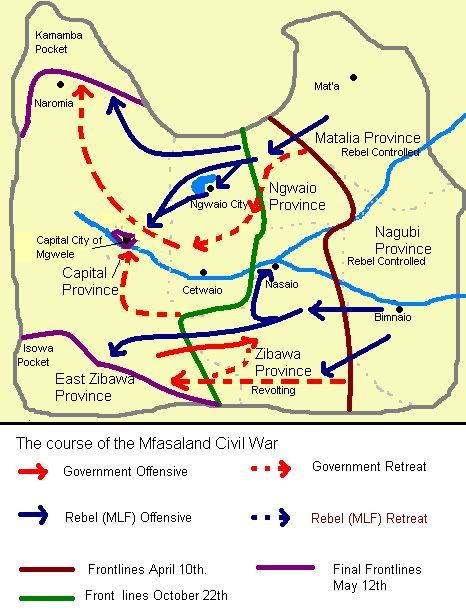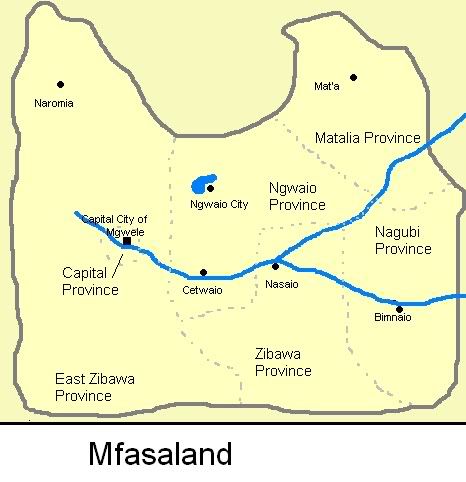Mfasaland

| |
| Flag of Mfasaland | |
| Motto: Deo juvante | |
| [ ] | |
| Region | Africa |
|---|---|
| Capital | Mgwele |
| Official Language(s) | English and Mfas |
| Leader | Nabuto Ngali |
| Population | 11 million |
| Currency | Isa |
| NS Sunset XML | |
Contents
History
Pre Colonial History
During the bronze age the Mfasan people migrated from the north into this fertile area and settled for good. The organized themselves in tribes. Tribal wars began and ended and over the centuries things was like this. In the middle ages the Tribes began uniting in alliances and this causes large scale wars between them. In 1278, King Natawaio Ngawana of the Mgwele kingdom conquored his last opponent and united the Mfasan tribes into one nation. Ethnicly they had always been one people, but until now they had not been ruled as one nation. The Ngawana Dynasty ushered in a prosperous age that would last until 1516 when King Ngaio II died and his sons fought in a civil war over the crown. The Golden age of Mfasaland saw an expansion of the realm; the Mfasan army was one of the best in this part of Africa and they conqoured several neighboring tribes. It was also during this time that trade was established with states as far north as Mali in the other end of Africa. When King Ngaio II died a 30 year long civil war began between his two sons, Matanaio and Zwaio. All provinces outside Mfasa was lost as they rebelled In 1546 Zwaio finally defeated his younger brother Matanaio and crowned himself King Zwaio of Mfasaland. The Kingdom however was in ruins. An estimated 20%of the population was dead and the economy was in ruins as nearly all the wealthy cities had changed hands several times and thus sacked as many times. King Zwaio was an able king and under his reign the country began to recover, but it was so weak from the civil war that it would take nearly 150 years for it to recover. From Zwaio's death in 1589 to 1654 a series of competent and incompetent rulers suceeded each others. The worst was Catwa I during his reign he overtaxed the population, isolated the nation and let public administration decline. In 1602 his brother Yaqu overthrew him and spent 50 years of his reign to repair the damage to the realm inflicted by Catwa. From Yagu II's reign until 1850 when King Natalwaio IV died heirless, the Kingdom saw a new peaceful age. The kingdom was not at it's previous heights and it's power declined under King Natalwaio IV who also died heirless. It did not expand by conquest but consentrated on developing trade and relations with other nations and repelling invasions from neighbors. In 1850 King Natalwaio IV died without heirs and the Ngawana Dynasty split in to waring factions in the civil war that followed. The civil war had lasted 5 years when Ngaio Ngawana crossed the border and raided a British tradingpost. The British responded by send troops and in 1860 Mfasaland had been subdued by the British and a Governor was appointed to lead this new british colony. In the short but very brutal second civil war, the Ngawana dynsaty had died out and the country was once again weak.
British Mfasaland
Under British rule Mfasaland recovered economicly and enjoyed peace and prosperity. The Birtish educated Mfasans as administrators and many joined the british colonial army in Africa as The Kings Mfasan Rifle Regiment. Not much happened during the British rule. Life was peaceful and the country was indutrialized by the British.
Independence
In 1953 the Nationalist leader John Mgala and his nationalist movement, the National Party succeeded in optaining independence for Mfasaland. In may 1954 the Republic of Mfasaland was procalimed. In the beggining all went well but an economic crisis struck in 1959 and in 1960 a communist, General Kagame Pataio pulled of a coup and installed himself as Head of State and Government and the Communist Party as the only legal party in the country. Free elections was banned and the Human Rights was wrtiien out of the constitution. From 1960 to 2007 the ecomony collapsed and the country suffered from several famines in 1989-1992 and again in 1998-2002. The communist regime had never been popular and in 2000 Idi Nogani was elected as People Commmisar (head of State and Government) by the Communist Party. At the same time a secret nationalist society of military officers was established by General Nabuto Ngali a man the government thought they could trust to lead the best of the Mfasan Army units, a fatal mistake. On April 9. and 10. 2006 he rebelled and 8 of the Mfasan Army divisons joined him, a enormous shock for the government. The diviosn that rebelled were against the best of the Mfasan Army and included the elite 1st "Lion" and 4th "Kwatan" Armor Divions.

15 Months later the Civil War, the Third in Mfasan history, was over and the MLF or Mfasaland Liberation Front was victorious. The Communist regiome had been toppled but at a high cost. The was danger of new famines and an estimated 600.000 to 1.200.000 million people are dead and the country in ruins. Free democratic elections will be held as soon as possible and although the country is in a dire state, many nations have plegded to send humanitarian aid and hopefully Mfasaland wil recover. It has before and could once more.
Provinces

1. Capital
2. Ngwaio
3. Zibawa
4. East Zibawa
5. Matalia
6. Nagubi
Each Province is administered by a Commisioner appointed by the government. During the communist regime a Commissar was appointed as head of a province by the Peoples Commisar (president). Each Province is divided into 8 Districts and each districts are divided into 40 Counties.
Politics
In the 1950's three parties emerged; The National Party, The Progress Party and the Communist Party, the later being very small and without much influence until the major economic crises in 1959-1960. During the Communist Regimne all other parties except the Communist Party was banned. After the liberation in 2007, the Mfasan Liberation Front, a nationalist movement was established as a party, The Mfasan Liberty Party. the MLF armed forces was incorporated into the new Mfasan Army, a new army modelled after the old Army of the Republic of Mfasaland which was the army of the Republic from 1954 to 1960. All other parties has been allowed agian. Four new parties have been established; The National and The Progress party has been reestablished and two new ones establised, The Social Democratic Party and The Christian Democrats. Free elections is planned to take place in march 2008 if the humanitarian situation is under control by then.
Culture
Mfasaland are home one ethnic group; the Mfasans. That makes the country unique in Africa in this aspect. The are like man of their neigbors. There are no longer tribal societies and it's considered one of the more socialy, western like nations of Africa.
Food: Food in Mfasaland has always been very spicey and full of fruits and meat. Escpecially meat from the gazelle are prized and the national dish is with this type of meat and spices. The national drink is a wine like drink from a slection of fruits. Dishes with fish and bird are also very spicey and one the Ngaga Zwois a fish dish, it's very spicey with sweet potatoes.
Demographics
The total poulation of Mfasaland are 12.470.870 millin people. Mfasland has two ethnic groups; Mfasans and Anglo-African (white descendansts of british settlers). The Mfasans make up some 90% of the population while 9 % are Anglo-African and 1 % are various others. Unlike South Africa, the white population has never been the ruling class of Mfasaland. They are found in every social class and % there as about 60 of the rich who are Mfasans. This fact have made the two groups very assimilated: Mixed marriages are common, they share the same schools, shops, busses and so on. Thats why the native Mfasans and Anglo-Africans see themselves as Mfasan Citizens and the word "Anglo-African" is not regarded by the white and black Mfasans as the proper name for the white population, it's acually seen as wrong in some parts of the population.
Largest Cities:
The Largest cities in Mfasland are: Mgwele: Population: 2.234.000 Cetwaio: Population: 1.007.977 Mat'a: Population: 769.087 Nasaio: Population: 568.880 Bimnaio: Population: 340.000 Naromia: Population: 234.000
Religious affiliation: 77 % are Protestant, all Anglo-Africans are Protestant, 23 % belong to Traditional Religions.
Economy
During the colonial and the first 5 years of the independent Mfasaland the economy was good. The large fertile plains of the country make ideal farm land and natural resources like copper, coal and iron are located in the hills and mountains of the eastern Nagubi and Matalia Provinces. The industry is located mainly in the Mgwele Capital Province, Ngawaio and Zibawa Provinces. The industry are mainly steel production, funiture production and food exports. The country has always been rich but the 40 year long communist wrecked the economy of Mfasaland. Famine swept the country allthough there were fertile land it was made into stae owned farms and production shrunk. The MLF promisses to reinstate a capitalist based economy modelled after European countries. The MLF are also working to get Mfasaland back into the Commonwealth of Nations, the organisation of former British posseions and UK. Mfasaland resigned from the Commonwealth in 1962 as the communist regime saw it as "Imperialist".
Education
The Education in Mfasaland are wuite good, The british colonial administration educated the population and an estimated 86 % of the poulation can read and write. There are two universities in Mfasaland and the MLF has plans to build one university more and even more schools and hihgschools.
